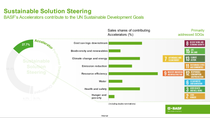Performance Polymers
Pushing the accelerator on sustainability with BASF
BASF’s Sustainable Steering Solutions method uses a comprehensive approach to sustainability
Today’s consumers are increasingly concerned about sustainability and their impact on the environment and are making changes to both their lifestyles and the products they buy.
This presents an opportunity for the companies designing and manufacturing these products to incorporate sustainable materials into the supply chain, providing environmental sustainability benefits as a competitive product advantage while simultaneously contributing to their own sustainability goals and initiatives.
In order to help meet these demands while working towards our own sustainability targets, BASF developed Sustainability Solution Steering, a systemic approach that uses a combination of market research, sustainability analysis, and product development and evaluation to improve individual product solutions and steer our entire portfolio.
Shifting to sustainability
The demand for sustainable products has increased in recent years as concerns surrounding climate change and the individual desire to make more environmentally-conscious decisions grows, according to a study which found that nearly 1 in 3 consumers claimed to have stopped purchasing brands or products due to sustainability or ethical concerns.
A similar study found that, perhaps surprisingly, Gen Z consumers were the least engaged in environmental issues but more focused on supporting brands they perceived as ethical, while younger millennials were the group most concerned about sustainability.
The term ‘sustainability’ can be construed in different ways. For many of us, climate change and reducing our own individual impact comes to mind when we hear it, but in reality, there are many processes and policies that play a much greater role in protecting and improving the environment around us.
How we design our cities, source our food and water, educate our children, and collect resources and materials are all factors in sustainable development, a concept the United Nations defined as “development that meets the needs of the present without compromising the ability of future generations to meet their own needs.”
Sustainability Solution Steering
The burden of sustainable development cannot be placed on the shoulders of the individual alone. Initiatives from government organizations and business must be employed to provide access to resources and options for us to make sustainable choices.
Sustainable Solutions Steering from BASF is one such initiative.
“BASF created the Sustainable Solution Steering initiative in 2012 to evaluate how the company's current portfolio can contribute to a more sustainable future,” says Mohamed Bouguettaya, Strategic Marketing Manager and Sustainability Champion at BASF. “The objective of this initiative is to provide us with a fully transparent and consistent evaluation of the sustainability performance of our products and solutions while also helping our customers reach their sustainability goals.”
Sustainability is an integral part of BASF’s corporate strategy, embodied in our company purpose: “We create chemistry for a sustainable future”. The Sustainable Solution Steering method assesses and steers our product portfolio based on defined sustainability criteria.
It considers the entire value chain and markets, including industry- and region-specific views, and reflects economic, ecological and social aspects of products and solutions in their respective application. This approach doesn’t simply analyze an individual product based on its environmental impact in the use stage; it considers how it’s made, its impact on the economy, and its role in society.
All about Accelerators

A graph showing Accelerator Products’ relation to UN goals
Once a solution has been evaluated for its contribution to the three main dimensions of sustainability (Economy, Environment, and Society), it’s assigned to one of four categories: Accelerator, Performer, Transitioner, or Challenged.
Accelerators are solutions that make a substantial sustainability contribution in the value chain. BASF has identified more than 16,000 Accelerator solutions within its portfolio, and 30.9% of BASF products analyzed already contribute to sustainability in the value chain.
“There's a specific process that we go through in evaluating these products, which always starts with a check for basic sustainable requirements,” says Bouguettaya. “We look at three pillars: Economy, Environment, and Society. First, to be considered as an accelerator, the solution should be profitable and contribute to the company’s economic development. On the Environment side, we’ll look at things like eco-toxicity to see if there is anything that's harmful to the environment in terms of material components. The third pillar is Society, so we look at things like human and labor rights. For example, if a product is produced somewhere in the world where labor rights are not protected, it would affect its classification and exclude it from the accelerator category.”
Once the basic sustainable requirements step passed, the next step is to check for the product’s Sustainability Value Contribution to the 17 Sustainable Development Goals (SDGs), a blueprint developed by the UN that works alongside strategies to improve health and education, reduce inequality, and spur economic growth while working to preserve oceans and forests and mitigate the effects of climate change.
If a product is found to contribute substantially to these goals, in addition to the criteria developed by BASF, it can be designated as an Accelerator product.
Products under the “Performers” designation meet basic sustainability standards in the market but have no substantial contribution to the sustainability criterion aligned with the SDGs. Transitioners are products with specific sustainability issues that are being addressed, and Challenged products are those that have significant sustainability concerns that have been identified.
“These products are phased out within the five years of their identification,” says Bouguettaya. “It's also important to mention that these designations depend not only on their contribution to sustainability but also the applications and regions they're used in, so you can find a product that is classified an Accelerator in one region but is a Transitioner in another region due to differences in the regulatory landscape, for example.”
The long term
Sustainable Steering Solutions and Accelerator products are designed to help both BASF and its customers reach their sustainability goals and targets and to make a substantial sustainability contribution in the value chain. As such, we’ve set a goal for ourselves: to increase the sales of Accelerator products from $17.6 billion in 2020 to $23.2 billion by 2025.
These products will also play a large role in our mission to achieve net-zero by 2050, an ambitious goal that will employ significant investment and research and development to replace fossil fuels with new technologies and create products that will allow customers to reach their sustainability goals.
“This is a unique offering from BASF, that our customers value,” says Bouguettaya. “It's an initiative that we took upon ourselves to bring transparency and clarity into the sustainability profile of our products.”

